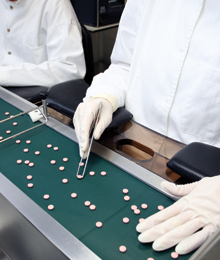Health Watch: Slashed Pharmacists’ Allowances
June 11, 2010 by Alex Consiglio
Filed under Health, Special Features
Ontario  Premier Dalton McGuinty’s Drug System Reforms are not the cheerful, one-dimensional guarantees his government claims they are, according to worried, independent pharmacists; but McGuinty’s government is steadfast and assures not only have the right steps been taken to ensure pharmacies’ survival, the reforms will also benefit the health care system overall.
Premier Dalton McGuinty’s Drug System Reforms are not the cheerful, one-dimensional guarantees his government claims they are, according to worried, independent pharmacists; but McGuinty’s government is steadfast and assures not only have the right steps been taken to ensure pharmacies’ survival, the reforms will also benefit the health care system overall.
Generic drug prices will soon drop from 50 per cent – set in 2006 reforms – to 25 per cent of their brand name counterparts, possibly saving the government more than $500 million a year. But looking past this money-saving exterior, pharmacists wonder, at what true cost to them?
In order to cut generic drug prices in half, the government must eliminate what pharmacists consider their lifeline,  so-called ‘professional allowances.’ This has pharmacists fuming over the loss of what was $750 million paid to them by generic drug manufacturers in 2009. Without this funding, pharmacists argue many will be forced to cut patient services, hours, employees or maybe even shut down – a looming prospect for the smaller stores which account for over 50 per cent of Ontario’s pharmacies.
so-called ‘professional allowances.’ This has pharmacists fuming over the loss of what was $750 million paid to them by generic drug manufacturers in 2009. Without this funding, pharmacists argue many will be forced to cut patient services, hours, employees or maybe even shut down – a looming prospect for the smaller stores which account for over 50 per cent of Ontario’s pharmacies.
For pharmacists, McGuinty’s stance was made clear through the subtext of his now infamous remarks at a May 19th 2010 press conference: “There are more pharmacies in Ontario than there are Tim Hortons in Canada. So, I’m not concerned about the number of pharmacies,” he said.
McGuinty alleges pharmacists are misusing their allowances, arguing 70 per cent of the money was used to boost revenues rather than increase patient care and also revealing hundreds of pharmacy owners either failed to, or incompletely accounted for allowance expenditures. And as pharmacists plead for public support, they fail to address the issues of transparency raised by the government.
“I will not go so far as to call [the professional allowances] kickbacks or rewards,” Minister of Health Deb Matthews said in a CBC report, “but I can tell you there are people who would do that.” Two days later, on April 9th 2010, she went on to tell CBC: “I am confident that the money we’re putting into the system to protect [smaller] rural pharmacies, to increase the dispensing fees, to pay pharmacists directly for services they provide to their customers will result in a better system, a fairer system.” But pharmacists have been making their own case for support. In April, the Independent Pharmacists of Ontario, Ontario Pharmacists’ Association and the Canadian Association of Chain Drug Stores wrote a letter addressed to Minister Matthews, highlighting their concerns. “Your proposed cut of these allowances deals a direct and severe blow to the ability of pharmacies to continue offering the high levels of service our patients have come to rely on,” they wrote. In place of the $750 million lost, the government has budgeted to grant pharmacies $150 million in new funding, and pharmacists argue the amount is inefficient; they are pleading for at least $260 million to fill the gap. But by also increasing the dispensing fees it pays to pharmacists by one dollar in urban areas and four dollars in rural areas, McGuinty’s government is confident pharmacies will be able to sustain the lost revenue.
The reforms, set for May 15th 2010, were delayed without a future timeline and this sparked speculation that lobbyists advocating increases in government funding may have had some success; McGuinty’s government says it’s committed to the funds already allocated.
As Matthews pointed out to Sunny Freeman of the Canadian Press, “[In 2006 reforms] we heard the very same thing[;] we heard that drug stores were going to close [and] we heard that services would be cut,” she said, “[but] they haven’t closed. They’ve opened 140 more.” On top of 140 new pharmacies opened since the 2006, the government says the money saved helped fund access to 150 new prescription drugs – proof that not only can pharmacists withstand reformations, but they’re also beneficial.
Now McGuinty is again promising every penny saved will be invested into improving the health care system, and as the battle continues, the course is irrevocable; allowances will be cut and generic drug prices dropped, again. After which, the only remaining question for pharmacists and the public alike, is what the government will do with its saved money.
www.stopcuts.ca, www.health.gov.on.ca







‘ There would be massive overtreatment with medications that are unnecessary, expensive, and often quite harmful’ says Allen Frances of DSM-4 Task force. Drug money has come to dominate psychiatry and Children Aid Societies. Unfortunate children, very sad or worried, weakened by lack of sleep, lack of nutrients, lack of skills to cope with stresses, misfortunes, losses, poverty,.. are given harmful psychiatric drugs by health helpers. These create further psychotic troubles, and more drugs are given to deal with those new troubles. The psychiatry and CAS industries do their best to treat patients with drugs as these bring in more funds from health insurance, than treatment without drugs.. They hardly seem to put the unfortunate children’s wellbeing first and centre. Intimidation, misinformation, pretending to be experts on the brain,.. they go on to harm children who fall into their care.
This is a piece of advice to bear in mind:’Before you decide to take your children for psychiatric evaluation or treatment for possible medication, you need to know whether or not the drugs can make children worse, and even psychotic and violent.’ There are very high rates of drug-induced psychoses. Yes . To have money, or to have insurance pay for you, is a misfortune. Poor countries, says Whittaker, R., in “Anatomy of an Epidemic’, have far more of their mental illness patients recover than insurance paying countries. So massive spending on health helpers is not benefitting the unfortunate patients. It is more adding to the fortunes of so-called heath helpers, who have mastered the skills of billing, and pilling without healing. Patients need to complete evaluation sheets of the people who treat them, and have a say about how much to pay a health worker.
Yes, sir, what is your expertise to offer advice on psychiatry? I have none. I use the expertise of genuine, proven, research experts. One is Dr. Peter R. Breggin, psychiatrist, researcher, a proper physician, not obsessed with lucre: not a ghost writer or a medical sorcerer. Books such as “Brain Disabling Treatment in psychiatry”; ‘Your Drug May be your Problem, “Medication Madness” among others, give me the advice to pass on to any who may be/ or is connected to unfortunates, and who has misplaced trust in prescribed psychotropic drugs
We read about, hear about, see very many unfortunate children misdiagnosed, mistreated, labelled, stigmatised, virtually ruined with prescribed drugs by ‘helpers’.Believe it,or not. Infants, young children, teens, .many of them, are made doubly unfortunate! Many will agree million$ are paid to harm the little and unlucky ones seeking help!
That, my friends,is my view. Who can speak and do something for the helpless. Why not Do so?.